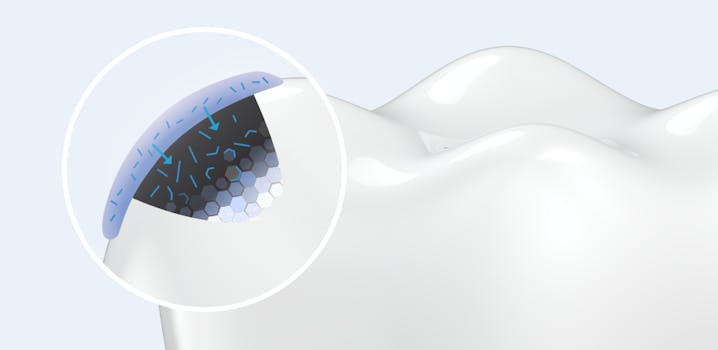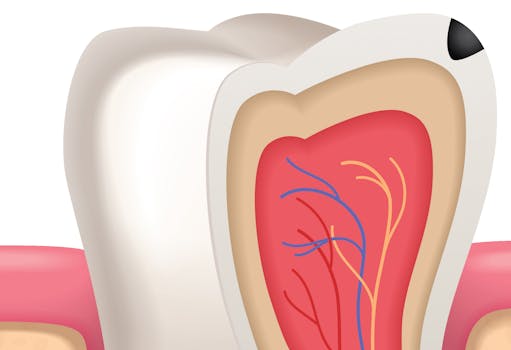How do I treat mild cavities?
Cavities are one of the most common dental conditions worldwide, affecting people of all ages. While many of us may have heard of cavities, we may not fully understand what it means and how to deal with it. In particular, mild cavities in the early stages can often go unnoticed, but it is important to recognize and treat them in a timely manner to avoid more serious problems. In this blog, you will learn about the causes of cavities, how to identify them, and how you can address mild cavities in the early stages with ALPINE WHITE "Caries Repair" - all without drills and fillings.



Mild Cavities vs. Severe Cavities
Mild, initial cavities, also known as incipient caries or enamel lesions, are an early form of cavities that affect the tooth enamel. The enamel is the outermost layer of the tooth and usually provides protection against cavities. However, when plaque and acids from bacteria attack the enamel, this can lead to mild cavity lesions. These lesions often appear as white spots on the teeth and are a clear indication that the enamel is weakened.
It is important to recognize and treat mild cavities in a timely manner to prevent further damage. While mild cavities typically limit themselves to the tooth surface, in more advanced stages, they can also affect the underlying dentin. This marks the transition to severe cavities, a serious dental condition that affects not only the enamel but also the dentin and possibly even the pulp of the tooth. If left untreated, cavities can penetrate deeper into the tooth and cause significant damage, such as tooth loss or inflammation of the pulp, requiring a root canal treatment. In advanced stages, cavity spread can also affect adjacent teeth or increase the risk of tooth decay and loss.
To treat severe cavities, more extensive measures may be necessary, such as a root canal treatment, filling, implants, or dental prosthetics. Various materials such as amalgam or modern composite fillings are used in dentistry to restore affected teeth and preserve their functionality. Special techniques like cavity infiltration can also be employed to stop cavities in chewing surfaces and prevent further damage.
Timely treatment at the ALPINE WHITE Studio can help address affected areas and halt the progression of the condition.
Causes of Cavities
Cavities are typically caused by a combination of factors, including:
- Poor Oral Hygiene: Inadequate brushing, lack of flossing, and failure to use interdental brushes can lead to the accumulation of plaque on the teeth, which attacks the tooth enamel. This allows cavity-causing bacteria to thrive and contribute to cavities.
- Consumption of Sugary and Acidic Foods: Consuming sugary foods and beverages as well as acidic foods can promote the development of cavities by encouraging the formation of acids in the mouth. These acids can attack the tooth enamel and ultimately lead to cavities.
- Weak Enamel: Some individuals naturally have weaker tooth enamel, making them more susceptible to cavities. This makes it easier for plaque to accumulate and attack the tooth enamel, increasing the risk of cavity formation.
- Inadequate Fluoride Intake: Fluoride is essential for the remineralization of tooth enamel and protection against cavities. Inadequate fluoride intake can increase the risk of cavities.
Symptoms of Initial Cavities
The symptoms of mild cavities can vary, but typical signs include:
- White or creamy-colored spots on the teeth
- Sensitivity to hot, cold, or sweet foods and beverages
- Superficial tooth pain or discomfort while chewing
Treatment of Initial Cavities - Caries Repair
When dealing with mild tooth decay, it's not always necessary to resort to conventional treatment methods such as drilling and fillings. An alternative option is Caries Repair offered by ALPINE WHITE. This innovative method not only successfully corrects visible signs of decay like initial cavities, white spots, and demineralization but also provides a pain-free and gentle treatment without invasive measures. This means that costly dental fillings or root canal treatments can be avoided.
Caries Repair utilizes state-of-the-art technology to remineralize your tooth enamel and strengthen the affected tooth without removing healthy tooth structure. By employing Caries Repair, the progression of decay can be halted while preserving the natural integrity of your teeth. This method aims to prevent deeper damage and promote long-term dental health.
Another advantage of Caries Repair is its high success rate of up to 93%. This indicates that the method is a reliable treatment option for decay in various stages, ranging from mild cases to deep decay reaching the inner dentin. With Caries Repair, you can find an effective and gentle solution for your decay condition without experiencing the inconveniences associated with traditional treatment methods.
If you're interested in learning more about Caries Repair and its benefits or seeking an alternative to conventional decay treatments, the team at ALPINE WHITE is ready to assist you. Let's work together to find an optimal solution for your dental health. Book an appointment online today.
Maintaining Healthy Teeth
A bright smile begins with a good dental care routine. Here are some tips on how to keep your teeth healthy and free from cavities:
- Use fluoride toothpaste: Fluoride strengthens tooth enamel and protects against cavities. Choose a fluoride toothpaste and brush your teeth thoroughly at least twice daily. Be sure to brush your teeth thoroughly, especially after consuming sugary or acidic foods. Remove food particles, plaque, and discoloration to keep your teeth healthy, white, and eliminate bad breath. Our ALPINE WHITE Toothpastes are optimal for thorough teeth cleaning.
- Regular professional teeth cleanings: Regular professional teeth cleanings and check-ups are crucial not only for removing stubborn plaque but also for preventing periodontitis and promoting gum and tooth health. Our teeth cleanings at the ALPINE WHITE Studio aim to not only clean the outer tooth structure but also protect the pulp and other internal areas.
- Pay attention to signs of dental diseases: Watch for sensitive gums, discoloration, or pain in the tooth area. If needed, immediately visit an ALPINE WHITE STUDIO to address any issues.
- Use mouthwash: Mouthwashes can provide additional protection and ensure optimal oral health.
By following these tips, you can ensure that your teeth remain healthy and maintain a bright smile.
Conclusion
Mild cavities should not be underestimated. Timely detection and appropriate treatment are crucial to avoid long-term issues. By maintaining regular oral hygiene, following a balanced diet, and undergoing dental examinations, you can protect your dental health. If signs of cavities appear, don't hesitate to visit an ALPINE WHITE Studio to prevent further damage. Your radiant smile is worth protecting!


